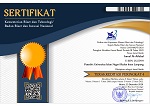KEBIJAKAN OTONOMI PERGURUAN TINGGI INDONESIA: ANTARA PRIVATISASI DAN KOMERSIALISASI
Abstract
The basic principle of the New Public Management (NPM) paradigm is to run state administration as it moves the business sector (run government like a business or market as a solution to the ills in the public sector). This strategy needs to be implemented so that the old model of bureaucracy that is slow, rigid and bureaucratic is ready to answer the challenges of the globalization era. The privatization of higher education in the form of PTN BH and BLU is an autonomous form of higher education institutions by adopting the values of NPM. In practice, there appears to be a shift and misunderstanding of the value of privatization which is interpreted as the commercialization of higher education. This article concludes that this higher education privatization policy has a negative impact, namely the commercialization of higher education, which if allowed to continue will grow the capitalization of education. Education can only be accessed by the owners of capital, while the lower class people are increasingly marginalized. Evaluation of the higher education privatization policy must be carried out immediately by the government in order to make improvements even if it is necessary to revoke and change the privatization policy of higher education.
Keywords
Full Text:
PDFReferences
Abrol, Monika, “Emerging Trends of Privatization of Education in India”. International Journal of Educational Administration. ISSN 0976-5883 Volume 8, Number 1, 2016
Barone, S., & Franco, E. L., “Design of A University Course Quality bay Teaching Experiments and Student Feedback (TESF)”.Total Quality Management , Vol. 20 No. 7
Bergh, Andreas,“Local quality work in an age of accountability – between autonomy and control”. Journal of Education Policy, 2015. Vol. 30, No. 4, 2015, http://dx.doi.org/10.1080/02680939.2015.1017612
Bøyum, Steinar, “Fairness in education – a normative analysis of OECD policy Documents”. Journal of Education Policy, 2014,Vol. 29, No. 6, http://dx.doi.org/10.1080/02680939.
Choi, Jin-Wook, “New Public Management or Mismanagement? The Case of Public Service Agency of Indonesia”. Journal of Governement & Politics. Vol. 7 No. 1 February 2016
Denhardt, Robert and Janet Denhardt, “The New Public Service: Serving Rather Than Steering”. Public Administration Review, November/December 2000, Vol. 60, No. 6
Diyanto, Chafid, “Pengaruh Dimensi Kualitas Pelayanan terhadap Kepuasan Siswa di SMA N 1 Purwokerto”. Thesis. Purwokerto : MIA Unsoed Purwokerto.
Hood, Christopher, “A Public Management For All Seasons?”. Public Administration Vol. 69 Spring 1991 (3-19) © 1991 Royal Institute of Public Administration ISSN 0033-3298
Islam, Fakhrul, “New Public Management (NPM): A dominatingparadigm in public sectors”. African Journal of Political Science andInternational Relations, Vol. 9 (4), April 2015.
Jidwin, Agnes Paulus and Rasid Mail, “The Concept of New Public Management: The Adoption Case in Malaysian Public Sector”. Proceedings of 4th European Business Research Conference9 - 10 April 2015, Imperial College, London, UK, ISBN: 978-1-922069-72-6
Kahar, Irawaty A., “Komersialisasi Pendidikan di Indonesia: Suatu Tinjauan dariAspek Politik, Ekonomi, Sosial, dan Budaya”. HISTORISME, Edisi No. 23/Tahun XI/Januari 2007.
Kalimullah, Nazmul Ahsan, etc., “New Public Management: Emergence and Principles”. BUP JOURNAL, Volume 1, Issue 1, September 2012, ISSN: 2219-4851
Kumar, Raj, “Privatization in Indian education. International Journal of Physical E ducation”. Sports and Health 2017; 4 (2)
Lie, Anita, “Implikasi Privatisasi Perguruan Tinggi”. Kompas. Kamis, 19 Agustus 2004
Muallidin, Isnaini, “Implementasi New Public Management (NPM) dalam Pelayanan Perizinan di Dinas Perizinan Kota Yogyakarta”. Working Paper• January 2015
O’Neill, John, “The privatisation of public schooling in New Zealand”. Journal of Education Policy, 2011. Vol . 26, Issue 1.
Perryman, et.al, “Translating policy: governmentality and the reflective teacher”. Journal of Education Policy, 2017. Vol . 32, No. 6
Puspawati, Ani Agus, “Penerapan New Public Management (NPM) Di Indonesia (Reformasi Birokrasi, Desentralisasi, Kerjasama Pemerintah dan Swasta Dalam Meningkatkan Pelayanan Publik)”. PUBLISIA (Ilmu Administrasi Publik) Jurnal.Volume 20, Nomor 1, April 2016
Rustiawan, Hafid, “Komersialisasi Pendidikan (Analisis Pembiayaan Pendidikan)”. TAZKIYA Jurnal Keislaman, Kemasyarakatan dan Kebudayaan, Vol. 16 No. 1 Januari-Juni 2015
Sureshchandar, G., Rajendran, C., & Kamalanabhan, T., “Customer Perceptions of Service Quality: A Critique”. Total Quality Management. Vol. 12
Traver, Amy. 2006. “Institutions and Organizational Change : Reforming New York City’s Public School System”. Journal of Education Policy.Vol. 21, No. 5, September 2006
Tyran, C. K., & Ross, S. C., “Service Quality Expectations and Perceptions: Use of The Serqual Instrument for Requirements Analysis”. Issues in Information Systems. Vol. VII, No. 1, 2006
Zulfikar, Achmad, “Dampak Komersialisasi Pendidikan terhadap Tata Kelola Pendidikan Tinggi di Indonesia”. Call for Paper Eduforia Tahun 2012 yang diselenggarakan oleh Badan Eksekutif Mahasiswa Universitas Muhammadiyah Yogyakarta. https://tirto.id/uang-kuliah-di-yogyakarta-semakin-mahal-cpqL
DOI: http://dx.doi.org/10.24042/ijpmi.v14i1.7574
Refbacks
- There are currently no refbacks.
Jurnal Ijtimaiyya is licensed under a Creative Commons Attribution-ShareAlike 4.0 International License.





1.png)
11.png)
.png)



